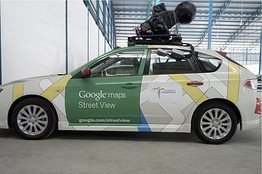Google Street View Set for Launch in Indonesia

The project, launched Friday by Indonesia’s Ministry of Tourism and Creative Economy and Google Inc., will be one of the tech giant’s largest initiatives in Asia. Custom Google cars fitted with cameras have already been deployed across the country with the end goal of allowing anyone with an Internet connection a panoramic view of key cities through street-level images, not expected to be ready for a few years.
Indonesia will be the third Southeast Asian country to get Google’s Street View service, after Singapore and more recently Thailand, where Google also partnered with the country’s tourism authority. Like many other Street View initiatives, the primary target audience is tourists and other visitors, allowing them to check out hotels and other attractions before planning itineraries, as well as serve the potential market within Indonesia’s 250 million people.
This could be especially useful in Indonesia where infrastructure bottlenecks have hidden some of the most beautiful tourist destinations – including secluded beaches, pristine dive sites and legendary temples – away from keen visitors. Businessmen, too, are now flocking to Jakarta and other key cities in the hope of tapping into Indonesia’s strong growth, but often need to strategically plan meetings close to hotels and offices to avoid Jakarta’s notorious traffic jams.
“With these digital tools, hotels, tourism sites and businesses can be more creative in making it easier for visitors to find their stores, location and websites,” said Mari E. Pangestu, Minister of Tourism and Creative Economy, at the sidelines of an exhibition where the service was launched.
Google said in a press statement that the project will be a “long-term investment,” without giving a specific date for the introduction of Street View, though it expects some images to be online in the next few years.
The company has run into privacy issues elsewhere when capturing Street View data, which involves real-time panoramic images, allowing anyone to scope out various locales without leaving their screens. Though some find the service convenient, others have expressed strong sentiments against having their faces, car license plate numbers and the like potentially exposed to millions.
Related News


